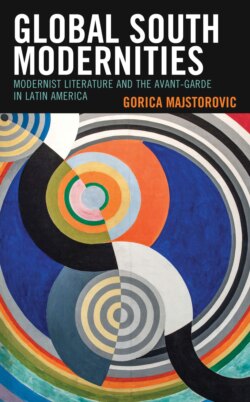Global South Modernities

Реклама. ООО «ЛитРес», ИНН: 7719571260.
Оглавление
Gorica Majstorovic. Global South Modernities
Acknowledgments
Introduction
Outline of Chapters
Avant-Garde and Mexican Petrofiction. The Emerging Circuits of Decolonial Knowledge across the Global South
Translation and Black Belonging in Contemporáneos (1928–1931)
Magnavoz 1926: Discurso mexicano
Geopolitics of Oil in Irradiador
Oil and Blackness in Panchito Chapopote
Conclusion
Notes
Decolonial Modernism: Amauta, Boletín Titikaka, and Zenit
The Insurgent Poetics of Small/Minor in Amauta and Boletín Titikaka (1926–1930)
Peripheral Modernisms of the Global South: Zenit (1921–1926)
“Périphériques vous parlent!”
“Bay Rum,” Vicente Huidobro’s Arctic Poem
Guillermo de Torre’s “Charlot”
South-South Intercultural Translation: Gandhi and Orozco, Tagore and Rivera
Conclusion
Notes
Cinematic Montage in Baldomera and Los siete locos
Baldomera’s Blackness: On Embodied Regionalism
“Los futuros dictadores serán reyes del petróleo, del acero, del trigo”: Los siete locos
Conclusion
Notes
Unsettling Travel Narrative: Darío, Henríquez Ureña, Güiraldes, and Arlt
Rubén Darío Tierras Solares
Pedro Henríquez Ureña Notas de viaje (A Cuba)
Ricardo Güiraldes Xaimaca
Roberto Arlt El criador de gorilas
Conclusion
Notes
Improbable Cosmopolitanism and the Global South
Immigrant Cosmopolitanism
Capdevila Writes Cosmohispanism
Henríquez Ureña’s Decolonial Cosmopolitanism
Conclusion
Notes
Bibliography
Index
About the Author
Отрывок из книги
Although I have been engaged by the issues raised in this book for a long time, the idea for the book got consolidated at a conference held at the University of Zagreb, Croatia in 2018. I presented there a paper titled “Towards a Decolonial Aesthetics of the Global South” and thought of the parallels between the two peripheries, the one where I was born and raised, and the one I chose to study. I would like to thank Ignacio López-Calvo for organizing the 10th Conference on East-West Cross-cultural Relations: East-West and Transpacific Studies in Zagreb and Ignacio Sánchez Prado for a keynote. This event has been an endless source of intellectual stimulation and inspiration.
I presented selections of this book at conferences hosted by the Modern Language Association (2017 and 2018), the Latin American Studies Association (2018), the American Comparative Literature Association (2017), the CUNU Graduate Center (2016), and the Society for Comparative Literature and the Arts (2017). I would like to thank the organizers, my co-panelists, and colleagues in the audience who engaged my work with constructive feedback. I sharpened my ideas on Latin America and the Global South in conversations that took place at the 3rd International Summer School of Latin American Studies at the University of Novi Sad, Serbia in 2019. I am particularly indebted to Bojana Kovačević-Petrović, Dejan Mihailović, Andreas Merck, Alexis Toribio Dantas, and Carlos Juárez Centeno for their incisive comments following my presentation on the literary effects and the global circulation of Mexican Muralism.
.....
Ignacio López-Calvo breaks a new path and employs the global analysis in Latin American criticism throughout his groundbreaking work on literary and cultural interconnections between Latin America and Asia, as well as through his editorship at Transmodernity: Journal of Peripheral Cultural Production of the Luso-Hispanic World that has published two special issues dedicated to “Thinking through the Decolonial Turn.” Transmodernity posits the periphery as the central notion of its orientation and focus. It follows Pratt’s insightful discussion of the ways in which European exploration and travel writing produced “the rest of the world” through the lens of colonialism and imperial imagination. Global South Modernities: Modernist Literature and the Avant-Garde in Latin America departs from these notions, substituting Pratt’s earlier use of “Third World” terminology with that of the “Global South.” In “Modernity and Periphery: Toward a Global and Relational Analysis,” Mary Louise Pratt points out that “in keeping with the decolonization of knowledge that began in the 1960s and accelerated in the 1970s and 1980s, modernity is now analyzed from a much more global perspective than before” (2002, 21). In the Latin American tradition that encompasses studies of modernity, she highlights the importance of works such as Beatriz Sarlo’s Una modernidad periférica (1998), Roberto Schwarz’s seminal work on Brazil, the CLACSO-sponsored volume Imágenes desconocidas: La modernidad en la encrucijada postmoderna (1988), Paul Gilroy’s The Black Atlantic (1993), and Arjun Appadurai’s Modernity at Large (1996).
The argument has been made that the process of decolonizing knowledge is the source of the “post” in postmodernity, not because it put an end to modernity, Pratt succinctly argues, “but because it put an end to the center’s self-interested and deluded understanding of modernity, provoking, among other things, a crisis in intellectual authority that academics are still struggling to confront and contain” (Ibid., 22). Pratt’s visionary assertion continues to ring true. The present book aims to be inserted into those debates and ongoing challenges in order to create what Pratt calls “a global and relational account of modernity” (Ibid.). Global South Modernities produces an analysis of Latin American interwar modernity through a decolonizing lens, only to point out that such historical and conceptual grounding of modernity (as global and relational) is necessary for inquiries about globalization in the present. Chapter 5 departs precisely from these inquiries as it broadens the scope of research to include the historical and literary discussion of immigration to Argentina.
.....